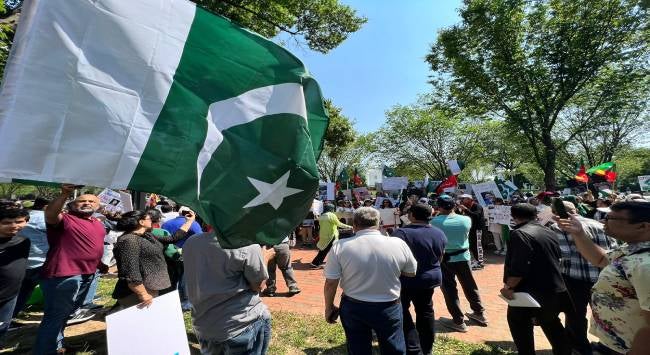Political Turmoil and Protracted Crisis:
Pakistan’s Battle for Stability and Democratic Processes
Imran Ahmed
29 May 2023Summary
The strained relationship between Pakistan’s security establishment and Imran Khan’s party, Tehreek-e-Insaf (PTI), has reached a critical stage, with Khan’s arrest on corruption charges leading to widespread protests. The military and ruling coalition have portrayed the PTI as a security threat, justifying resort to the Pakistan Army Act and Official Secrets Act to prosecute protestors. Concerns arise about the impartiality of these trials and the transparency of the process. The pressure of arrests, legal sanctions and harassment has led to a wave of PTI resignations. Meanwhile, Pakistan faces economic challenges, including a depreciating currency and a current account deficit, compounded by political volatility that hampers comprehensive reforms. Pakistan’s reliance on street politics complicates crisis resolution. The army’s cohesion has been questioned, but its power and resources make it a formidable player in the long run.
The strained relationship between the security establishment and Imran Khan’s party, Pakistan Tehreek-e-Insaf (PTI), escalated to a critical stage when Khan was apprehended on corruption charges at the Islamabad High Court, sparking extensive protests. The events surrounding his arrest and its subsequent aftermath exposed a concerted effort by Pakistan’s military and the ruling coalition to portray the party as a security threat.
The army’s response to the protests led to many arrests and the repeated harassment and imprisonment of senior leaders from the PTI. As a result of the coercive and legal pressures faced by the PTI, several resignations occurred, including that of Shireen Mazari, the party’s senior vice president. The National Security Council, composed of both civilian and military leaders, authorised the implementation of the Army Act and Official Secrets Act to deal with individuals suspected of being involved in the unrest on 9 May 2023. This decision was later ratified by the federal cabinet, approving the use of military courts for the trial of protesters. In a press release, the army issued a warning, stating that no restraint would be exercised against those who attack military installations and establishments, emphasising a firm stance against perpetrators, spoilers and violators under all circumstances. These measures serve as a legal pretext for the army’s resistance against Khan and the PTI. The utilisation of military courts raises apprehensions regarding the impartiality of trials, and doubts persist regarding the transparency, accountability and legality of the entire process.
Despite distancing himself from the violence, Khan continues to push back. The PTI is anticipated to emerge victorious in upcoming elections (when and if they are held), and Khan wields significant influence on the streets. During his speeches, Khan asserts that the rule of law has been compromised as Pakistan’s failure to conduct elections disregards both the Constitution and the Supreme Court’s directives. Directing his criticism at the army chief, Khan boldly states, “If there is someone in power who, to safeguard his interests, is dismantling our democracy, our constitution, and our fundamental rights, then he is essentially jeopardizing the future of this nation to protect himself.”
The impasse between the establishment and the PTI gives rise to two major long-term concerns. Firstly, the political turmoil and constitutional crisis make it challenging for Pakistan to address its economic issues through comprehensive reforms. The country’s economic situation is worrisome, characterised by challenges such as a depreciating currency, inflation and a current account deficit. Despite ongoing negotiations for a substantial bailout with the International Monetary Fund (IMF), progress has been limited. Notably, Pakistan has had 23 IMF programmes since gaining independence while India has sought IMF assistance only seven times and none since 1991, and Bangladesh has had 12 such programmes. The recurrent nature of these problems indicates long-term structural issues in Pakistan, including excessive reliance on imports, low savings and inefficient financial practices. A significant restructuring of the economy is required, which will initially have an impact on many individuals financially. However, the escalating political volatility raises the political cost of unpopular measures like tax reforms and price hikes, particularly in light of impending elections.
Secondly, Pakistan’s inability to disengage and transform street politics into parliamentary politics of bargaining through constitutional channels and elected representatives means that prolonged crises become difficult to mitigate. Historically, the judiciary or the army has played the role of intermediaries in periods of protracted political deadlocks. But as the current situation involves the security establishment, this becomes difficult, and speculation rises on the nature of the conclusion of the current crisis. The questions concerning the internal cohesion of the army have been raised unprecedentedly as the military’s public image continues to be a casualty of the fallout in the conflict with the PTI. However, the army is a powerful corporate and political institution above and beyond individual commanders and generals. It has the resources for the long game. Whether the PTI is able to continue to stand its ground is the most pressing question. The wave of recent resignations suggests that it is the PTI that is struggling to hold as the establishment responds.
. . . . .
Dr Imran Ahmed is a Research Fellow at the Institute of South Asian Studies (ISAS), an autonomous research institute in the National University of Singapore (NUS). He can be contacted at iahmed@nus.edu.sg. The author bears full responsibility for the facts cited and opinions expressed in this paper.
Pic Credit: PTI USA Official’s Twitter Account.
-
 More From :
More From :
-
 Tags :
Tags :
-
 Download PDF
Download PDF



